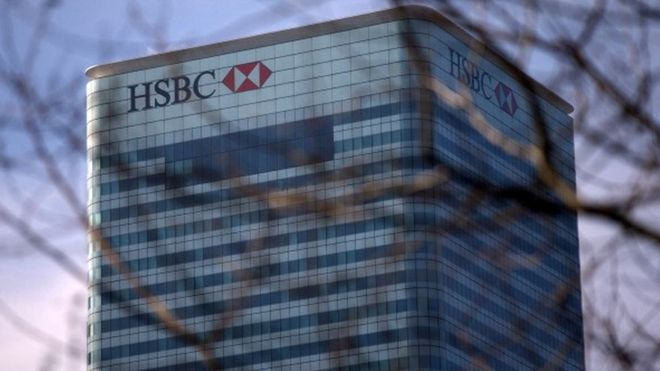HSBC first-quarter profit falls 14%

Banking giant HSBC has reported a 14% drop in profits for the first quarter following "extreme levels of volatility" in financial markets at the start of the year.
Profit before tax came in at $6.1bn (£4.17bn) for the three months to March, down from $7.1bn a year ago.
However, analysts had expected a far steeper fall in profits.
HSBC chief executive Stuart Gulliver said the bank had been "resilient in tough market conditions".
Job cuts?
A conference call scheduled for later in the day could offer clues on possible further cost-cuts.
The lender had flagged earlier in the year that it would impose a global freeze on pay and hiring to cut costs by the end of 2017.
Independent banking analyst Frances Coppola said it was "likely there will be more job cuts" at HSBC following the fall in profits.
But she said the results "could have been worse" after financial markets were highly volatile in January and February.
Challenging
HSBC's adjusted revenue for the first quarter amounted to $13.9bn, a 4% drop from the same time last year.
The bank also said the development of its Asian business was gaining momentum, "despite a challenging environment with key increases in market share in debt capital markets, China M&A and syndicated lending".
HSBC has had its headquarters in the UK since 1993, but the financial institution makes most of its money overseas, and Asia accounts for the majority of its profit.
The bank's shares are listed in London, Paris, New York and Hong Kong. HSBC shares in Hong Kong were down by 1.4% before the quarterly results were announced, but then recovered some ground to stand 0.3% lower.
Volatility
Swiss bank UBS also reported a sharp fall in income for the first quarter of the year, with pre-tax profit falling 64% year-on-year to 978m Swiss francs ($1.03bn; £689m).
UBS also pointed to "substantial volatility" as one of the main reasons for the fall, along with wider economic and geopolitical uncertainty.
However, French bank BNP Paribas reported a 3.4% rise in first-quarter pre-tax income to €2.6bn (£2bn).
Политика конфиденциальности | Правила пользования сайтом







